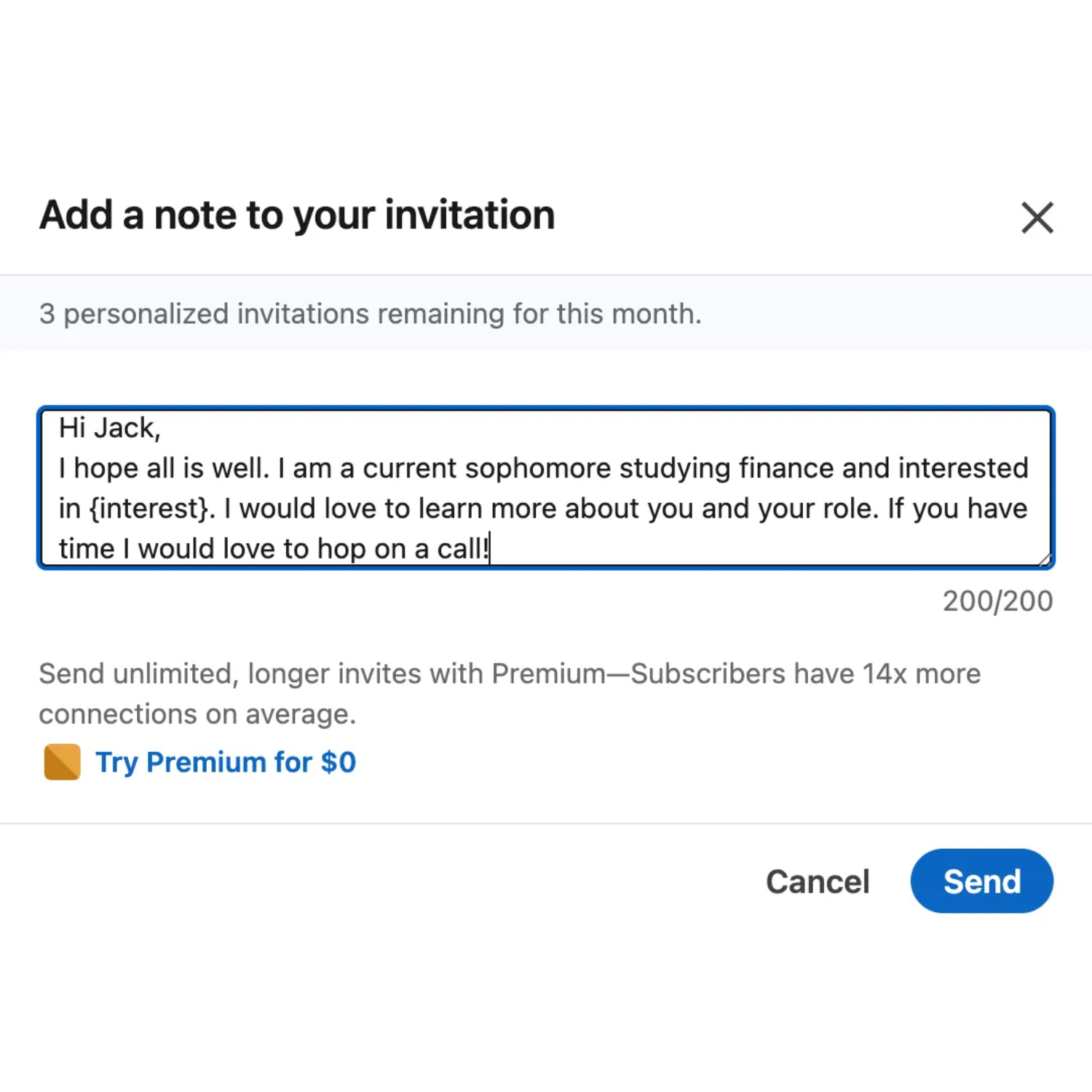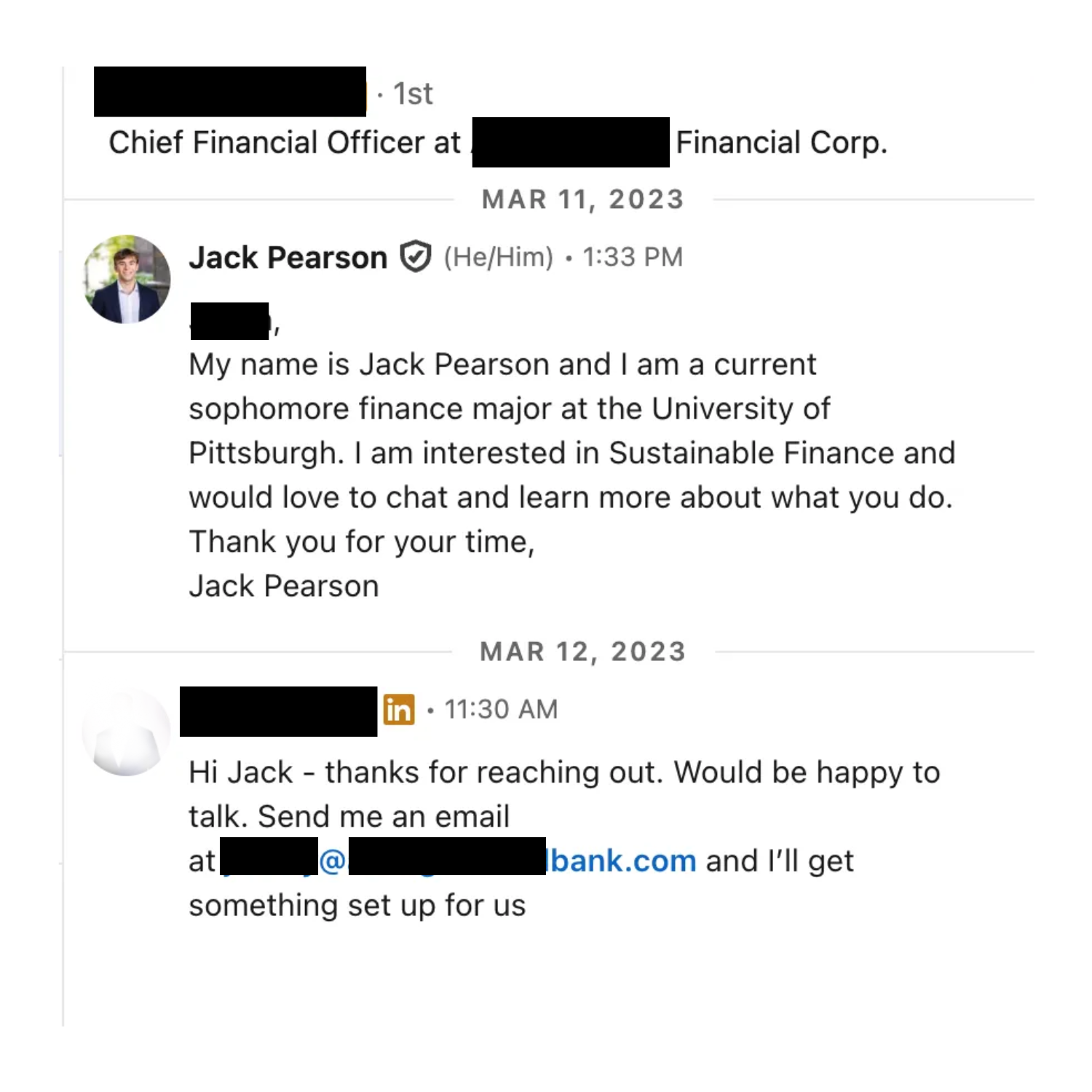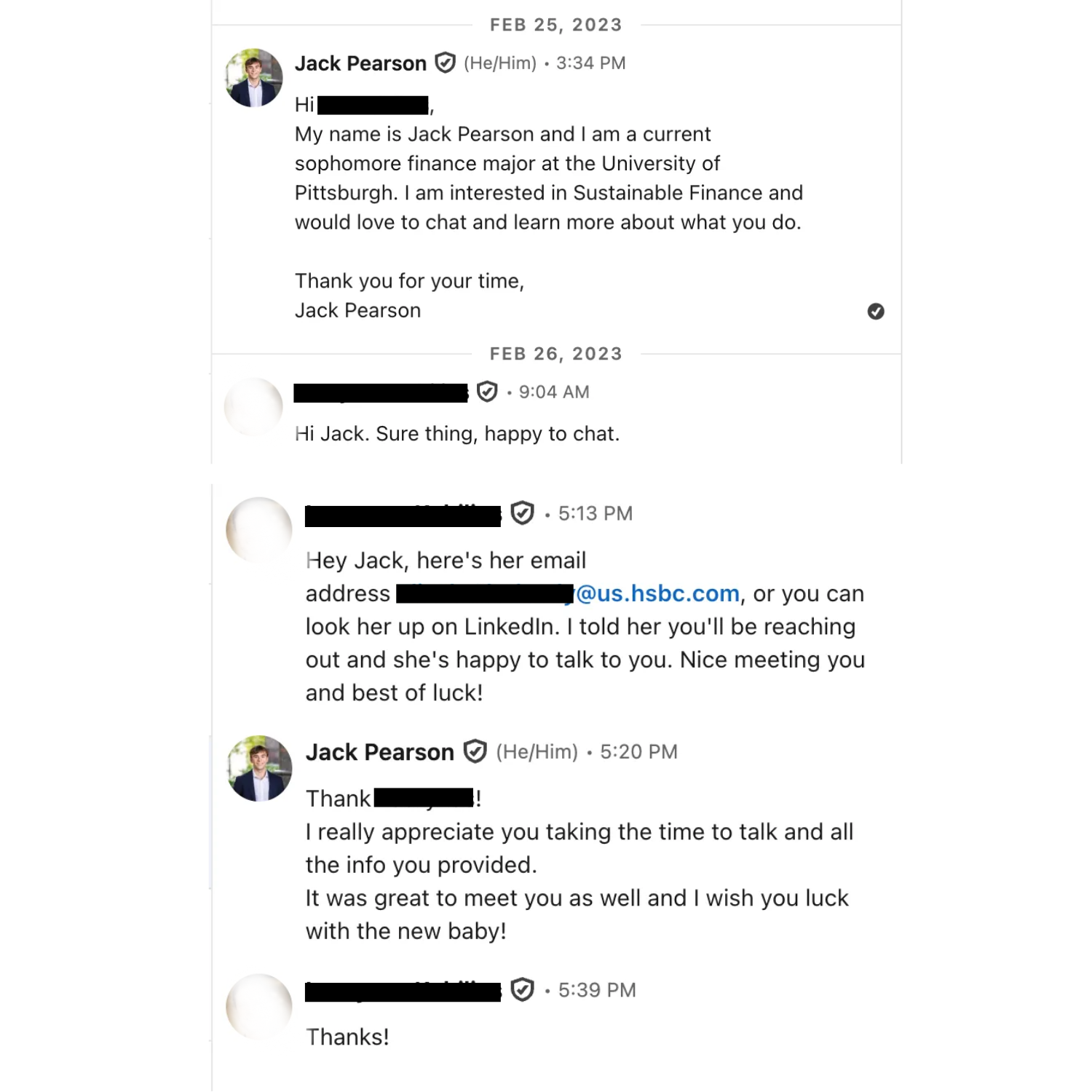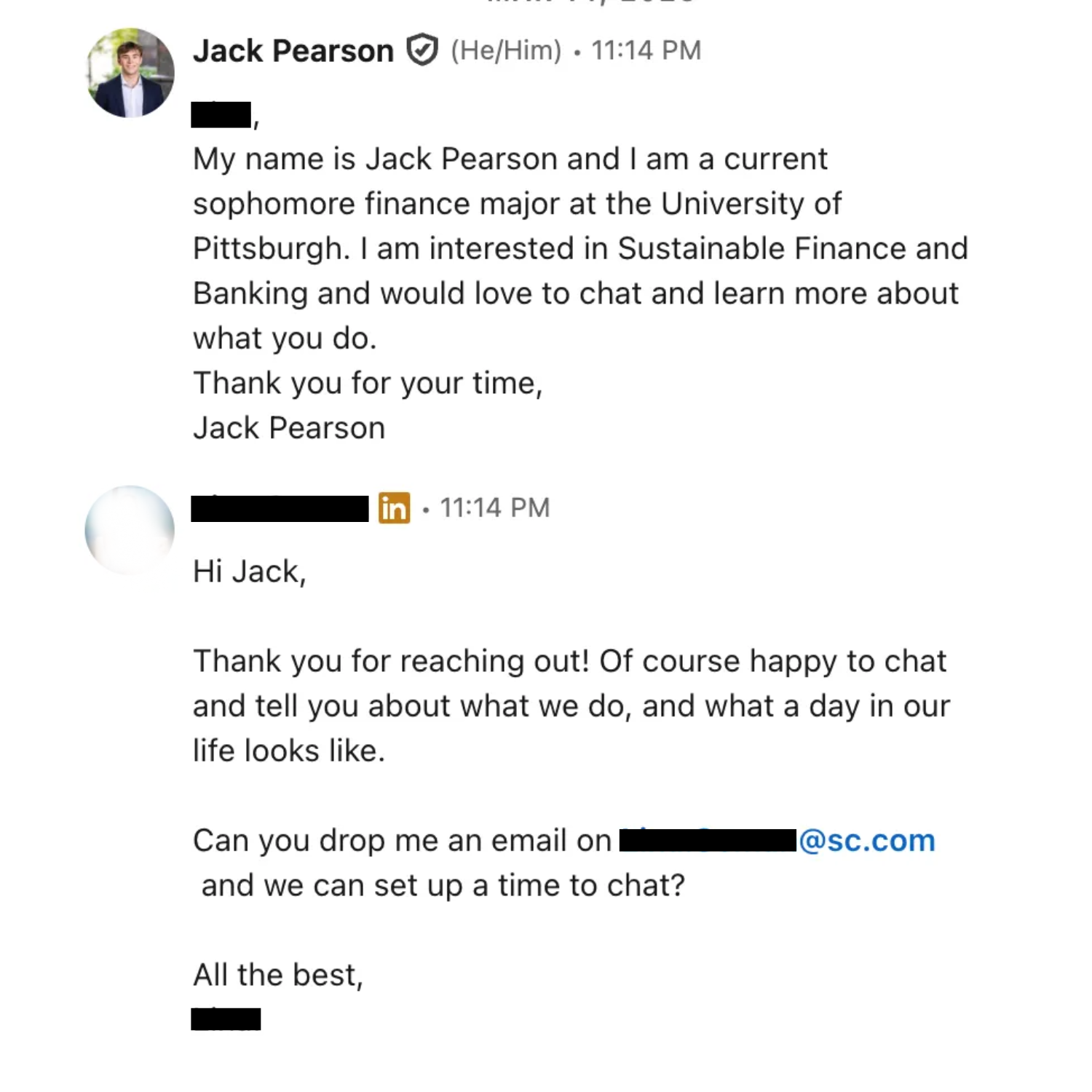How I landed a job on Wall Street at 19
In August of 2024 after a 10-week internship in NYC, I accepted a full-time job offer for a six-figure Equity Research position at BNP Paribas. I studied finance in college and had multiple other internships in finance. I want to share my experience landing this job from a non-target school and how someone in college can replicate the results.
Overview of the Timeline
Applying/Networking → Interview for Internship → Summer Internship → Full-Time Offer
Positioning Yourself to Get an Interview
In order to get an interview you need to have a few things in order. This includes your resume, LinkedIn, or other professional profiles in order to pass the initial screens by many of these companies or recruiters. In this blog, I will not go into too much detail about resumes I have made another blog "How to Create a Resume" that focuses on this in particular.
Be Early
One thing that will boost your chances significantly is to be proactive in your internship search. If you are late in the game and scrambling to find an internship you are less likely to receive help from someone senior as they will not have the same perception of you as someone who contacted them 2 months earlier.
The timeline for banking has continued to creep earlier and earlier. In some cases, you are landing an internship 1.5 years before you will ever hit the desk. In my case, I interviewed in April of my sophomore year, 14 months before I would start my internship. This means you have to be thinking and have everything in order during your sophomore year, over a full year before your internship.
“Sophomore Summits”
In my case, I was constantly searching my school's career center resources and job postings. We used Handshake, a recruiting platform that my school used. There I found a few “Sophomore Summits” which are 1-2 days recruiting events for interested sophomores to learn more about the bank and engage with recruiters. I applied to the posting in early February and was able to get invited to the summit at BNP. (Some banks offer internships to sophomores that get them in the pipeline for junior-year roles as well.)
I submitted my resume (this is why it's important to be on top of your resume early in college) and completed a pymetrics test (a platform to test your cognitive and emotional aptitude). This was not uncommon for insights programs or internships as you typically have to do initial screening via HireVue (a 1-way interview) or some computer software. Attending a Sophomore summit is the best way to get in the door without any extreme networking.
Networking
Networking is the best thing you can do for yourself and helps you learn more about the field. During the month of February, I sent over 600 LinkedIn requests to all sorts of bankers and finance professionals and had well over 50 Zoom/phone calls. There are a few key tips to make the networking process smoother that I will outline below.
Start with Recent Alumni
The easiest and least stressful way to learn about your industry and meet kind like-minded people is to reach out to recent alumni of your school that work at places you are interested in. These are two tips in one reach out to alumni and reach out to juniors first.
Reach out to alumni as they are much more willing to help you. Alumni have a tie to the school and want to help out people that were in their shoes. Your best bet for a helpful call is to find someone from your school.
Starting your networking journey with more junior people is also very key. I made sure to reach out to juniors even at places I wasn’t super interested in working at just so I could get practice, giving my elevator pitch, asking insightful questions, and understanding the flow of a 15-30 minute phone call with a random person. Juniors are much more likely to let mistakes slip and help you out.
Prepare Beforehand
Prepping for just 10 minutes before you get on the call with someone can make all the difference. No one wants to talk to someone who hasn’t done the basic courtesy of doing a little homework. You asked for their time, and you should make sure to use it effectively and leave them feeling like they were helpful. If they have to spend time explaining where they work and their role, you have not done enough homework.
LinkedIn is great for this because many people have their work history spelled out for you, but if they are more senior it might require some more digging. Sometimes “doing your homework” might mean talking to others within the bank or juniors on their team. If you had met everyone on their team before them, you would have a lot more context to ask questions.
Send the Right Message
Below is a sample message that you could send on LinkedIn for free today. Unfortunately, LinkedIn has scaled back its message requests and you can only send 3 for free. Your best bet is to try premium for free for 1 month and send as many as you can in that window.
As I mentioned I had the premium free trial and sent over 600, so it's possible.
This message is short to fit within the 200-character limit. With premium, you should get bumped to 300. I have also included actual messages I sent to people during my networking sprint.
Free Message Sample

Message Sample CFO

Message Sample Getting Recruiter Contact

Message Sample MD

It is also important to note that LinkedIn is not the only method of contact. You may need to send more LinkedIn requests versus emails. People check email far more frequently than LinkedIn. You might use LinkedIn to find someone on a team, then try to find their email online or with a new AI tool. I took the LinkedIn route but might try this in the future for other roles.
Make sure your profile is clean. People will be much more likely to talk to you if you present yourself professionally.
You must network to do well
The skill of networking is key and if you develop it early it will allow you to go much further much quicker than your peers. It doesn’t stop once you get the internship offer as well. During my internship, I have 90 coffee chats with peers at the bank. That is over 10 per week for the 9 weeks I was on the desk. If you have your questions down and you have developed the skill it won’t be very hard. (I sent over 100 emails to colleges during my internship asking to meet)
Play the “Student Card”
While you are in college play the student card as much as you can. What do I mean by this? Act like you are only interested in learning and that you don’t want or need anything from them. Don’t ask desperate for an internship offer but act curious and always be inquisitive about their role and work. This continues into your internship as you are “just an intern” and here to learn. Use this to your advantage to get time with people who normally would never talk to you.
Preparing for the Interview
Now this section assumes you have landed a superday or equivalent interview for the internship. I will go through how I got mine quickly and then give actionable tips for how to prep. As I mentioned I was fortunate to get into a sophomore summit. During the second day of the summit, they did a group interview that acted as your first round screen. If you asked questions and presented yourself well you would be selected for a super day the following week. I will not go into a ton of detail about superdays and what they are as Google has plenty of resources. Instead, I will share my prep and what it entailed.
Interview Prep Overview
1. Research/Study
First and most important is independent research and study. Since my interview was for sales and trading I had a more holistic approach to study than some other positions. For investment banking or consulting you may have to work through a book or do case studies, but for my role I studied the market and attempted to form an opinion on the current outlook. This entailed watching as much news as I could get my hands on and taking notes. I watched hours of Bloomberg and read reports detailing what was coming and any historical trends or events.
I also prepped on the bank itself and its outlook. I read all the recent blog posts and reports on their website so much so that my interviewer said “Wow that is almost our exact thoughts here it's like you read the reports” which I did.
I was also fortunate that my networking came in handy as complex topics like the crash of Silicon Valley Bank which was headline news at the time was explained to me in detail to prepare for any interview questions about the topic.
Overall I researched the market, studied the bank and its role, and prepped any relevant question topics that could come up. I made sure to have an opinion not just regurgitate things to show deeper understanding.
2. Question Prep
The question prep was focused on prepping specific interview questions for the role. Simply looking up “Sales and Trading Interview Questions” did the trick for me and I had a hundred to look through.
There are two types of questions you need to be prepared for in most interviews, behavioral and technical.
Behavioral questions are more about your story and personality. Again look up examples but in order to prep for these you need to have 5-10 good stories that you can pull out and use for a variety of questions. These stories should be created using the STAR method. Check out MIT’s guide for STAR Questions
Technical questions can vary by job function and industry. For my role, I again google typical questions and make sure I have answers. For example I had a stock pitch prepared, and I knew what common indexes and bonds were currently trading at, and I could explain concepts related to trading (inverse yield curve, bond pricing, options, etc).
Sometimes you will get brain teasers that can really throw you off. Your best bet for these is to practice, but also just have a thought process and use it to the best of your ability. Try to work out the problem logically and many times that is enough. If you don’t know a question do your best but don’t be afraid to say you aren’t sure and you will get back to them. That is a great way to follow up and give more detail on that question (it is better to answer everything correctly though)
3. Mock Interview
Finally, for acing your interview it is best to do some mock interviews. Luckily at my school, we had a career center that had this option and I booked one with an upperclassman who landed a full-time role in the same role I was interviewing for. She had already gone through all the processes we had gone over and was able to give me some real questions she had asked just a year before. If you don’t have this luxury get a friend to read off some questions, talk to an AI, or just record yourself answering common interview questions. It is important to get a few reps and solidify all your prep into coherent answers.
How to get the offer during the internship
Assuming you followed all the advice above and put your best efforts in on the interview, you might have been lucky enough to secure an internship offer and are getting ready to start. Here are the best tips that I attribute to landing a full-time offer.
1. Be early stay late
I was the first one in and the last one out for my internship whenever possible. This was the single biggest key for me and allowed me to show in real time my work ethic and dedication. When you stay longer than everyone they begin to respect you almost immediately. It also allows you to expand your work into longer time chunks. As an intern you don’t get a ton of work right away, so working late allows you to be slow and develop the skills at your own pace. If you are cramming work to try to leave at 5 pm you will most likely provide worse results than the guy who took his time. This practice also says a lot without saying anything, you show don’t tell and your work speaks for itself.
2. Be proactive
Another key to the internship is being proactive. This includes doing things without being explicitly told, giving yourself things to work on, and asking for ways to help and projects. For me I was given a few projects to work on, and those I did to the absolute best of my ability. Once I got a handle on those I began to ask for other things to do or ask more junior people for ways to help them. Being proactive also just means listening and thinking of ways to help. If in doubt ask your direct superior how to help them and just start there.
3. Be professional
This seems simple but it is one of the keys to being successful. Remember you are a professional and you should do your best to act like one. This means being respectful, being timely, and maintaining composure. I like to think of my email as a digital footprint of how I was as an employee. I always write professional emails and treat everyone I come in contact with respectfully. I also show up looking professional (or at least as professional as I can lol) and present myself in a respectable way. As interns, we are still in college and can sometimes get drawn into drama or silly things with others but it is best to avoid this and focus on the task at hand, getting a job.
Final Thoughts
I hope you found some of this helpful. I tried to write a fully comprehensive guide to how I landed my full-time role and how anyone in the same position could land a role as well. To wrap things up I think it is important to remember this is your career, your life, your story, no one is gonna write it for you. You have to take ownership and put as much in as you want to get out. I got a satisfactory result because I put in sufficient effort to make that happen. I came from a non-target school and landed and really awesome post-grad job with a great salary. You can too it just takes effort. Good luck
- Jack
Published on June 25, 2025
Back to Blogs